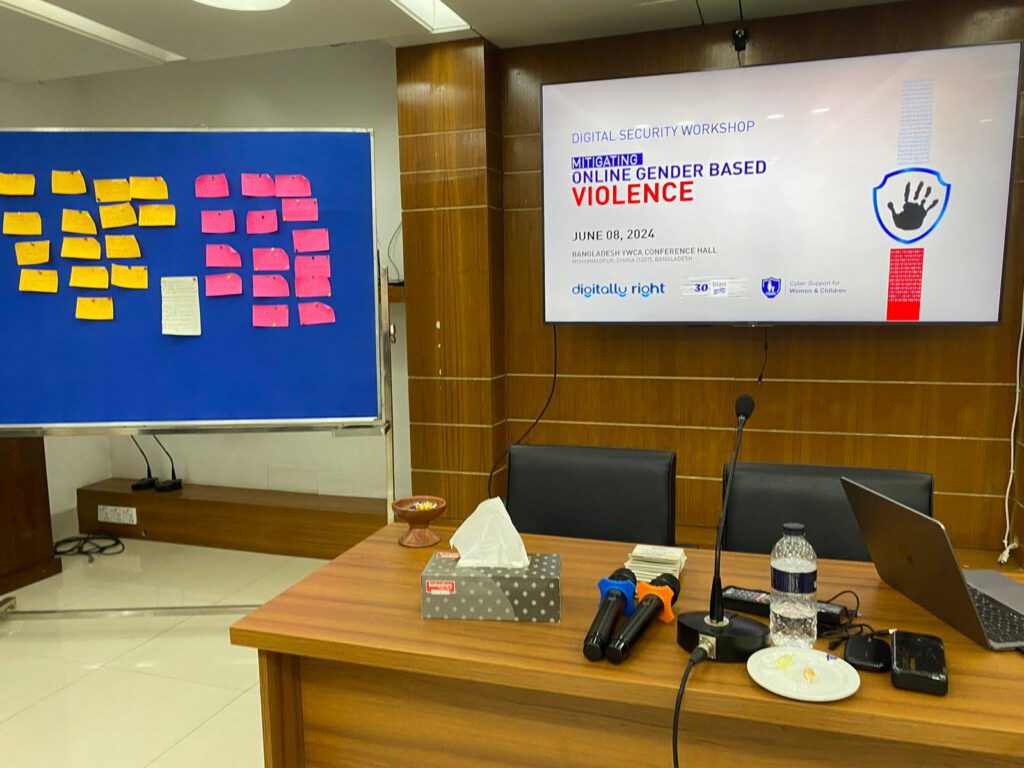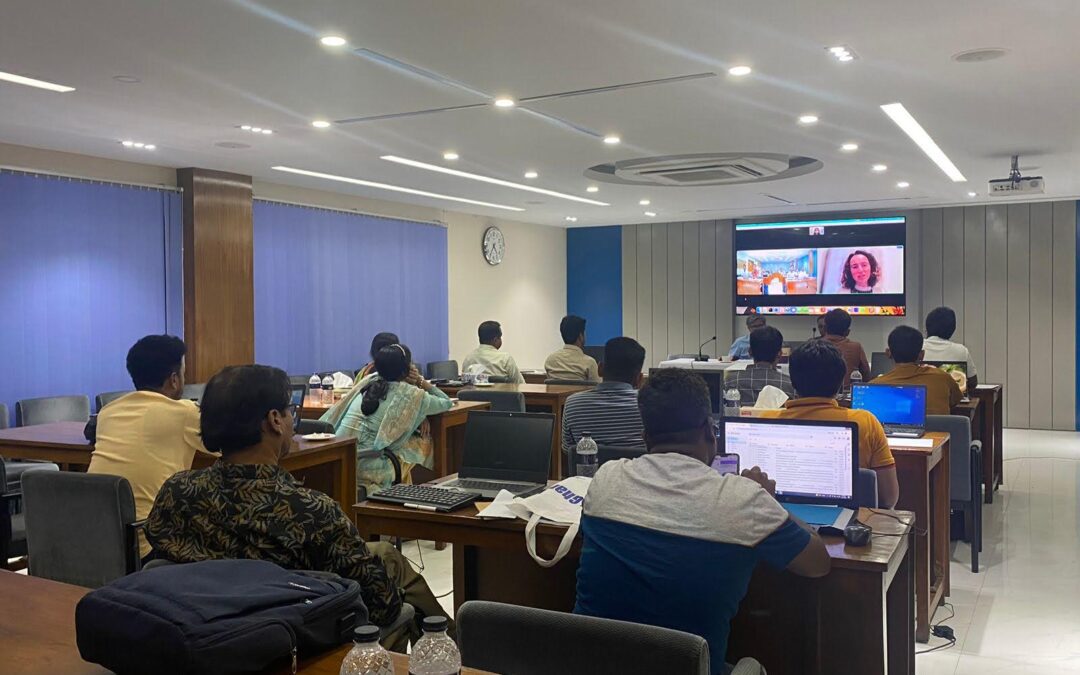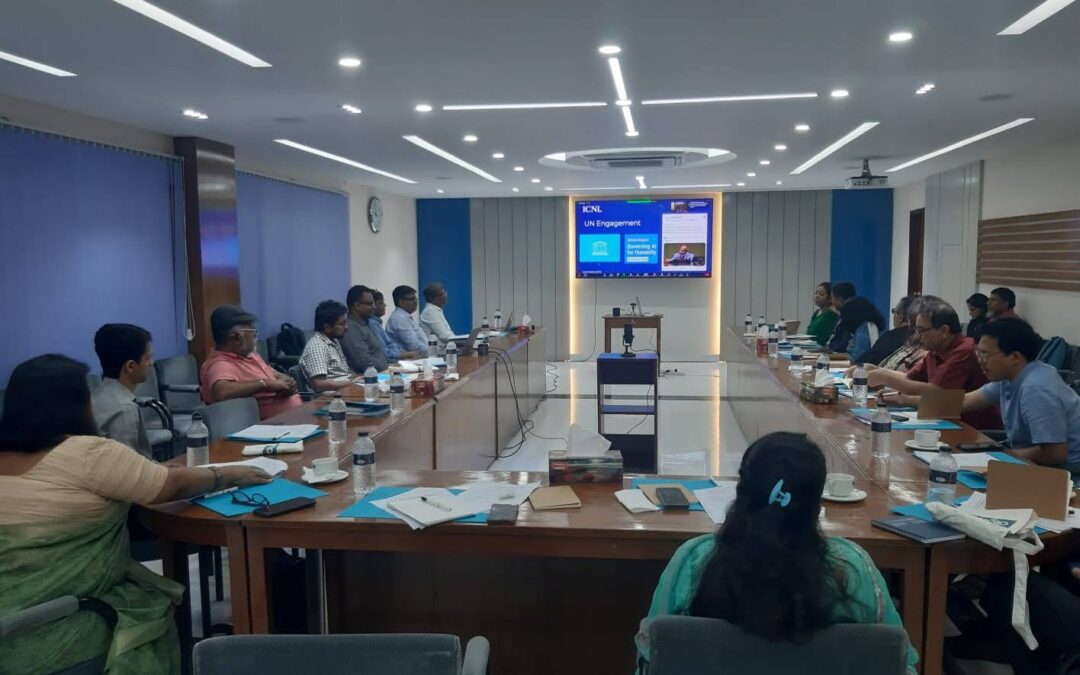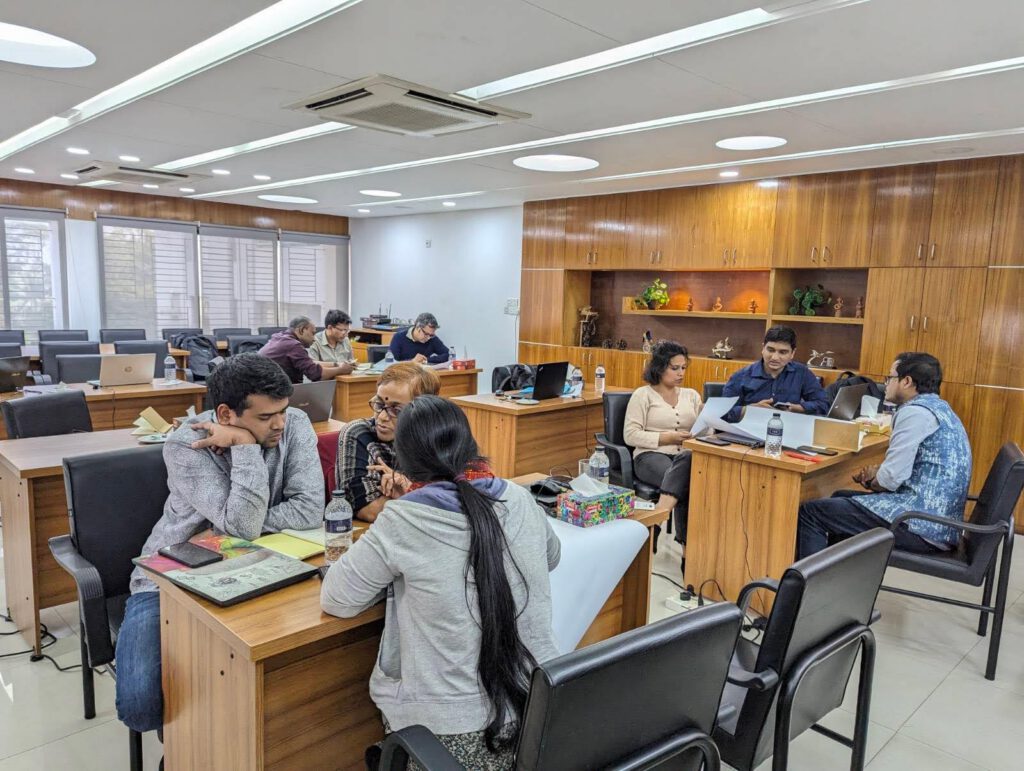
by Digitally Right | Jul 4, 2024 | Our work, Updates
The Digital Rights Advocacy training was a four day event organized by EngageMedia. The training was attended by participants from 7 different countries in the Asia Pacific region, namely – Bangladesh, Cambodia, Indonesia, Maldives, Nepal, Philippines and Sri Lanka. During each of these sessions the organizers dealt with various aspects related to advocating for rights and at the same time encouraged the participants to share their own experiences in their respective countries.
The first day of the training consisted of introductions among the participants, organizers and the trainers followed by a rundown of the entire training design. Afterwards, the participants were asked to share the safety concerns related to advocating for digital rights in their respective countries. The session concluded with a discussion on the Three-Part Test, a three fold test that is used to determine the validity of a law. On the second day of the training the participants got to learn how to strategize our digital rights advocacy efforts and how to achieve engagement with government agencies. The third day of the training focused on engaging with the private sector including identifying how the private sector can contribute towards the fulfillment of digital rights and aligning the policy priorities of the private sector with digital rights advocacy. The fourth day of the training was a culmination of the learnings from the previous two days and working together for the feedback submission of the Internet We Want.
All four days of the training consisted of numerous interactive sessions and group works. During these group works the participants were divided into 2 groups and they had to come up with advocacy strategies for the various scenarios provided by the organizers. During these exercises the participants discussed the strategies that have worked in their own countries. The most eye opening part of the whole training was how similar the problems faced by all the countries were. For instance, all 7 participants could relate to their countries having laws that justified overbearing surveillance using national security. These group activities helped the participants identify common problems and exchange ideas and strategies that they have applied in their own countries. All in all it was a great network building initiative along with being a training program.

by Digitally Right | Jul 3, 2024 | Digital Security, Our work, Updates
On the 8th of June 2024, Digitally Right organized a Workshop titled “Digital Security Workshop: Mitigating Online Gender Based Violence.” This event is part of the Greater Internet Freedom (GIF) project, a USAID-sponsored global program that stands as the largest global effort dedicated to advancing Internet freedom. Digitally Right partnered with Internews and EngageMedia in GIF in Bangladesh.
The Workshop was attended by 16 participants from various CSOs and gender rights activists. Among the 16 participants, 10 belong to the Cyber Support for Women and Children platform. This platform is an alliance of 13 organizations in total that safeguard women and children from violence online. As such, this Workshop was highly relevant and useful for the group. The other 6 participants belong to the OGNIE Foundation, a gender-focused non-profit organization based in Bangladesh.
The Workshop started with an ice breaking session. This workshop took a unique approach where the participants themselves were in charge of the discussion points. With the help of an interactive activity, the participants teamed up to identify the common issues women, in their experience, face online and pinpoint the topics that they want to learn about during the workshop. This activity revealed a concerning number of threats women face online which include revenge porn be it by means of having intimate pictures and videos being leaked without consent or having their pictures photoshopped to appear obscene, hacked social media accounts, identity theft, bullying and doxing.

Based on the threats identified, the participants dove into a session to learn about the risks associated with some common online practices and how to circumvent them. This was followed by a session on password management to avoid social media account hacking, the importance of activating 2 factor authentication, encrypted communication options and how to identify and bypass phishing attempts.
The workshop also included sessions on reporting and documenting harassing and bullying comments online as well as a session on how various apps track our activities on the phone and how to stop them. The last session on the Workshop consisted of a group activity where the participants were divided into groups of 4 and given 4 different scenarios on revenge porn, cyber bullying, identity theft and account hacking. Each group came up with a solution as to how they will handle each of the situations and presented in front of everyone else. This group activity helped everyone to connect and exchange ideas and strategies. The Workshop concluded with a summary of the entire day’s event.

by Digitally Right | May 27, 2024 | Our work, Updates
Following its launch on May 5, 2024, Digital Safety School successfully held its very first 2-day Digital Hygiene Training from 18-19 May. The training was attended by 13 journalists stationed in different parts of Bangladesh. The two-day training started with learning about the basic do’s and don’ts of maintaining digital safety.
On the first day, the participants learned about account and browser security, data encryption tools and how to transfer and delete data securely and the best practices for capturing photos and videos on the ground. The second day of the training consisted of the participants learning about device and communication security, identifying malware and phishing attempts and the use of fact checking tools to identify fake images and videos. After each of these sessions, the participants were given the opportunity to practice the tool they learned about under the supervision of our security expert. This gave the participants more confidence about their capability to use the tools by themselves later on.
When the training concluded, one journalist expressed their gratitude for the opportunity and shared that, “During Covid-19, I would constantly watch videos on social media to learn about safe digital practices and although I was able to learn about the risks of the digital space, I was none the wiser about safe practices. By attending this training, I am now aware of the risks as well as how to protect myself from the threats.”
Another participant shared, “During the session on using fact-checking tools to identify fake images and videos, I thought that it would not be useful for me. But once the session ended I realized that the session was relevant for me and I did not even realize how much I needed it.”

by Digitally Right | May 5, 2024 | Our work, Updates
Digitally Right is delighted to launch Digital Safety School. The objective of this school is to empower individuals and organizations with the skills to navigate current and emerging digital threats. Through this initiative, Digitally Right aims to support civil society, media and the private sector as well.
This school offers one free access and two on-demand services. The school will organize a monthly two-day free access training which interested candidates can apply for. The training will be administered by Digitally Right’s expert team. Apart from that, the school will also offer on-demand services such as training packages based on the needs of different organizations and digital safety audits for small to mid-sized organizations. In the near future, the school aims to launch a resource center which will provide tailored tips and advice on emerging digital trends and threats.
If you are a journalist, or editor or fall within the broader civil society, please apply for our free access training using the form. The training is expected to be held on the third week of each month and candidates will be selected on a rotational basis.
The Digital Safety School is a collaborative initiative and we welcome partnerships and collaborations from organizations who share our vision of a safer digital future. For inquiries regarding collaboration opportunities, please do not hesitate to reach out to us via email at dss@digitallyright.org.
For further information and to stay updated on the latest developments, explore our website at https://digitalsafetyschool.com.
Join us on this journey towards a safer and more secure digital future.

by Digitally Right | May 5, 2024 | Digital Rights, Updates
On April 29, Digitally Right, in collaboration with ICNL, held a workshop focused on legislative issues titled “Understanding the Draft National AI Policy.” The session was attended by 17 participants, including representatives from media outlets, environmental organizations, human rights defenders, and gender activists. The workshop aimed to raise awareness, strengthen advocates’ capacity, encourage in-depth discussions, and develop strategies to influence changes to the Draft Policy. Shabnam Mojtahedi, Legal Advisor for Digital Rights at ICNL, delivered a presentation on the Draft AI Policy and its implications, followed by a discussion on strategies for engaging with the government on the issue. Participants also shared their individual concerns regarding the Policy.
During the workshop, ICNL’s presentation highlighted common concerns about AI and its potential impact on human rights. Shabnam then discussed best practices for consulting and engaging with the government on AI-related issues. She also pointed out that the lack of a globally accepted definition of AI has resulted in the Draft Policy being vague and broad. Since no jurisdiction has established standalone AI laws, there are no clear precedents for treating AI as a separate legal issue.
Participants at the workshop agreed that the government should base the AI Policy on international best practices, with civil society organizations (CSOs) playing a key role in bridging the gap between the government and global partners. They emphasized the need for effective and diverse engagement in the policy process. It was noted that the Draft Policy lacked impact assessment, monitoring, and evaluation mechanisms, which need to be addressed. While national security carve-outs are common in AI policies worldwide, participants stressed the importance of strong oversight in this area to prevent data abuse.
Following the presentation and Q&A session, participants held an open discussion to identify strategies for influencing the government to amend the Draft AI Policy. Three strategies emerged. The first is to file a Right to Information (RTI) request, seeking details on which CSO representatives were involved in the consultation and drafting process, and to challenge the legality of the Policy, as it is required by law to be drafted in Bangla rather than English. The second strategy involves rallying public support to delay the Policy’s implementation, eventually pushing for its repeal on the grounds that it is not functional. Some participants suggested pursuing both strategies simultaneously.
The third strategy proposed is the creation of a national alliance consisting of CSOs and AI experts. This alliance would engage with grassroots communities, gather their feedback, and present it to international forums.

by Digitally Right | Feb 15, 2024 | Digital Security, Updates
Digitally Right hosted its first Digital Safety Training under the fourth year of the Greater Internet Freedom (GIF) project, a global initiative supported by USAID, on February 10-11, 2024. As part of this effort, Digitally Right collaborated with Internews and EngageMedia to implement the program in Bangladesh. The training was attended by 12 journalists, including 8 male and 4 female, who spent two days learning critical skills for navigating the digital space securely.
The training began with an ice-breaking and introductory session, followed by an overview of the internet, its functioning, and the associated risks. Participants voiced their security concerns, including fears of being surveilled or having their locations tracked through digital devices. These concerns set the stage for the next session, which focused on information security, both online and offline.
After each session, participants practiced using the relevant tools, allowing them to apply what they had learned. The session on tools for safely capturing photos and videos was of particular interest to the group, marking the conclusion of the first day of training.
The second session started with a recap of the previous day’s lessons. Participants then learned about securing communication on both emails and mobile phones. However, they found the mobile phone security training more relevant, as they generally do not use email for confidential information.

Participants then took part in a group activity where they were presented with a scenario and tasked with creating an action plan using the tools they had learned. Following this, they were introduced to the risks associated with digital footprints and instructed on how to protect their privacy while browsing the internet. The session ended with a review of the entire training.








